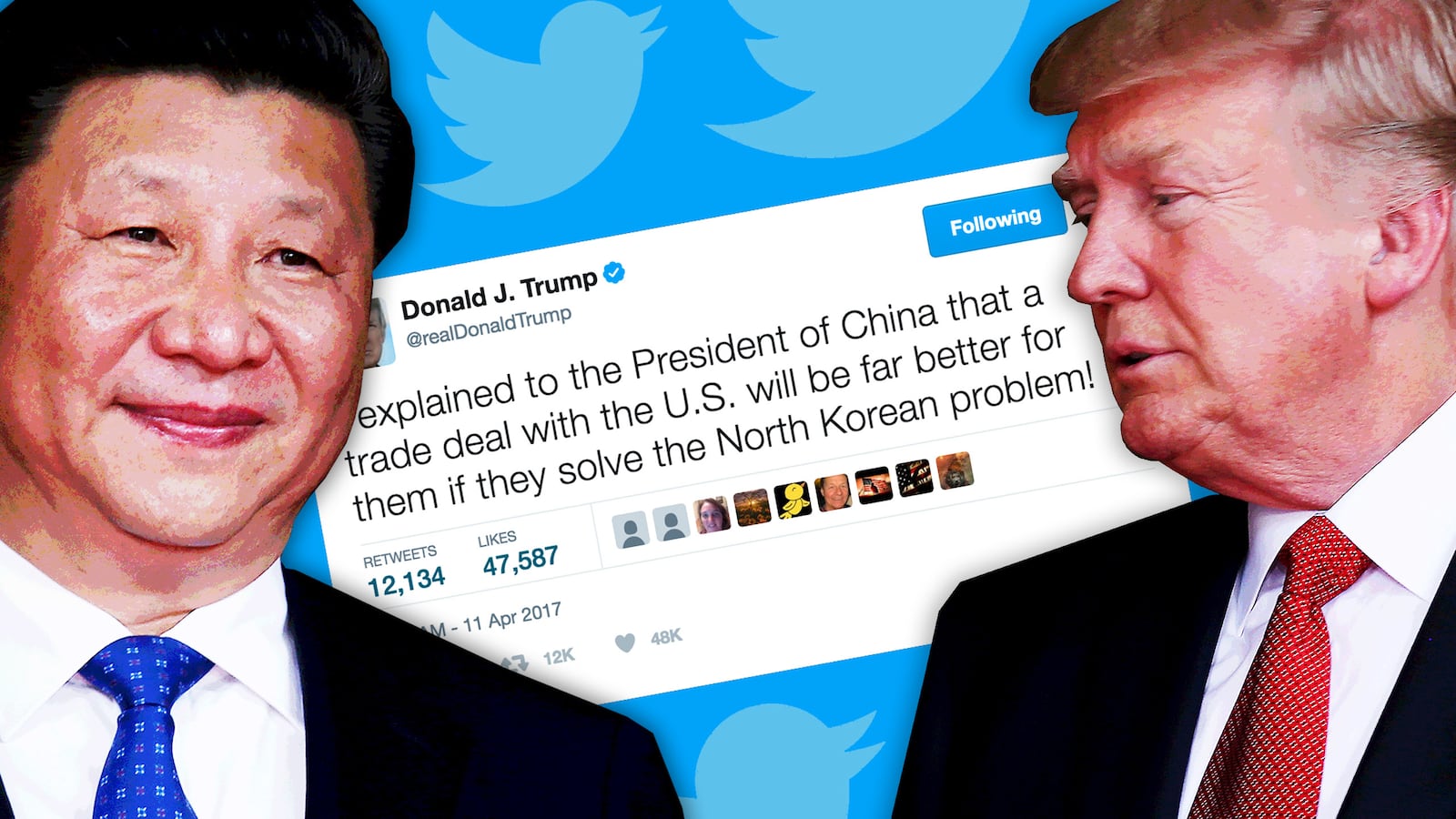First came the summit, then after a bit of a delay and several distractions, the tweet: “I explained to the President of China that a trade deal with the U.S. will be far better for them if they solve the North Korean problem!” President Donald Trump proclaimed on Twitter early Tuesday morning.
Here is what he should have said to his Chinese counterpart, Xi Jinping, in well under 140 unequivocal characters: “Stop dangerous North Korea behavior and end predatory trade practices immediately. I’m demanding, not dealing.”
Trump ought to have learned over the years that sometimes the art of the deal is knowing when not to deal. But in Mar-a-Lago, he just folded. On trade, instead of taking immediate action, Trump acceded to a Chinese proposal to delay matters by adopting a “100-day plan.”
But, unfortunately, there is little room for America to delay on the Democratic People’s Republic of Korea.
North Korea already poses a danger to the American homeland. The Obama administration is reported to have told Trump transition officials that the North was America’s “top national security priority.”
It’s not hard to understand how a destitute state could get to the front of the list. It had help.
Beijing, for instance, supplied mobile launchers for the North’s KN-08 missile, and China is the most probable source for Pyongyang’s new solid-fuel missiles. Chinese enterprises have shipped semi-processed fissile material to the Kim regime along with components for its nuclear weapons program.
Trump, short of starting history’s last war, is not in a position to interdict this commerce crossing China’s border with the North.
He can, however, stop the trade—and cut Beijing’s ties with Pyongyang—with asymmetric tactics. He can, for example, target China’s banks cooperating with North Korea. Late last September, the Justice Department seized money in 25 accounts maintained at Chinese banks when it shut down a Chinese operation, based in the border city of Dandong, laundering money for Pyongyang.
Incredibly, Justice issued a statement exonerating the banks involved in the scheme. Given the circumstances, it is almost impossible for the banks not to have known of criminal activity.
Chinese banks look like they were also involved in the February 2016 theft of $81 million from an account at the Federal Reserve Bank of New York. Last month, The Wall Street Journal reported that federal prosecutors are investigating whether certain “Chinese middlemen,” acting on behalf of North Korea, orchestrated the heist from the account, which belonged to the central bank of Bangladesh.
If Chinese middlemen were conspirators, Chinese financial institutions were almost certainly complicit in the crime.
If such institutions were complicit, the U.S. should cut them off from their dollar accounts in New York.
Trump in Mar-a-Lago could have looked across the table at Xi Jinping and told him that, if he did not stop North Korea, the Chinese banks involved in these crimes would never clear another dollar in New York or withdraw another cent from any of their New York accounts.
And it is not only small fry banks that would be unplugged from the world’s banking system. Bank of China, one of China’s “Big Four” banks, was named in a recent UN Panel of Experts report for its links with what appear to be illicit North Korean activities. Moreover, one of the other Big Four banks also conducted suspicious deals for North Koreans.
Because the North poses an imminent threat, Trump does not have much time to negotiate. Within, say, four years the Norks will be able to mate a nuke to one of their three missiles—the Taepodong-2, the KN-08, and the KN-14—that at this time can reach the lower 48 states. At this moment, the Kim regime can put a nuke on top of its intermediate-range Nodong and send it to Japan. Guam, the American territory home to large U.S. military installations, may be in range of the Musudan.
And Kim Jong Un, the dictator who says he is an enemy of the U.S., already has another kind of delivery system able to reach New York or Washington. His technicians can disassemble a crude atomic device, his diplomats can smuggle the parts into America, and his operatives can put the device back together on top of the only delivery system he now needs, a pickup truck.
I suspect that, if Kim ever wanted to attack the U.S., this is how he would in fact do so. Why? The U.S. might not be able to attribute the device back to North Korea. Without attribution—we do not know all of North Korea’s uranium isotopes—there would be no retaliation.
So when Kim threatens to hit the “U.S. mainland” with a nuclear weapon, as he did a few hours ago through the official Rodong Sinmun newspaper, he is not making a hollow threat.
Apparently China is not in a mood to help Trump on North Korea. Despite all the comments from Secretary of State Rex Tillerson about how Beijing sees North Korea in much the same way Washington does, The New York Times reports that Xi in Mar-a-Lago was “circumspect” when the discussion came around to the Kim regime.
The past two American presidents have tried to win China’s cooperation on the North. Yet since 2003, the beginning of the now-dormant Six-Party Talks, Beijing has most of the time sided with its only formal military ally, Pyongyang. Throughout the process, Chinese negotiators won the North Koreans time, the most important element they needed to build a nuclear device, improve their missiles, and make their state dangerous to America.
Yet Trump can succeed where Bush and Obama failed. He can for the first time ever give Beijing an immediate incentive to work with Washington by targeting one Chinese financial institution.
Xi Jinping might not believe the 45th president has the political will to carry through on an ultimatum to move against China’s financial institutions, but Trump only has to unplug one bank to prove them wrong. And save America.






